|
|
|
|
U.S.A., I.C.B.M.s, U.S.S.R., O.D.A.M.M.I.T., "Star Wars" & M.A.D. at B.Y.H.S., 1965.
|
|
|
|
We had two outstanding speech teachers during my years at BY High. The first was Lynn Benson, and the second was Kenneth Bowthorpe. Their talents were amazing. Under their confidence-building instruction, ordinary students became accomplished actors, high-powered speakers and successful debaters.
|
|
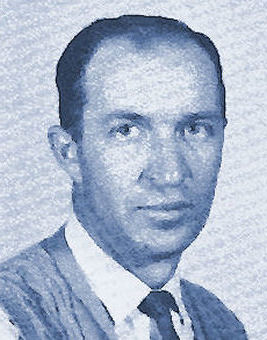
Lynn Benson |
|
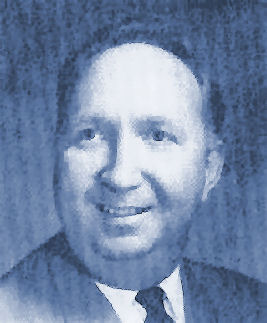
Kenneth Bowthorpe |
|
In the 1962-1963 school year, the Interpretive Team took first place in the Class "B" State Festival, and the Forensic Team won the Class "B" State Championship.
In 1963-1964, the Forensics Team repeated as winners of the State Class "B" Forensics Meet, and the Interpretive Team repeated as State Class "B" Champions in the State Festival.
During the summers, many BY High students found employment in the Playmill Theater, West Yellowstone, Montana, founded by Lynn Benson. Mr. Benson moved on to become a speech professor at Ricks College in Rexburg, Idaho, but the Playmill continued to attract BY High talent.
After Benson left, his successor was Kenneth Bowthorpe. For many excellent reasons, BY High moved from Class "B" to tougher Class "A" competition in 1965. While individuals placed high in their categories in the next few years, the entire team did not sweep the state meets again. The competition statewide became fierce, and they were determined not to take their competitions with BY High lightly.
During those years a national debate commission selected a new annual topic of general importance to be debated pro and con by forensics teams at all member schools. These topics included such things as U.S. economic policies, the role of the United Nations, and compulsory arbitration for union disputes.
|
|
In the 1964-1965 year, the topic focused on the dangers of nuclear proliferation. As members of the BYH debate team, we diligently researched our topic, and soon had hundreds of pro cards and hundreds of con cards. We debated frequently in class, and sometimes after school. We participated in various tournaments at other schools and colleges.
|
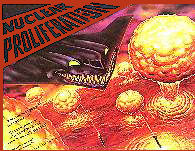
|
|
Our debate and drama teacher, Mr. Bowthorpe, was quite expert at listening and helping us to improve. Nevertheless, toward the end of the year, the tedium of debating a single topic over and over again became almost more than some of us could bear.
That year Neil Riddle and I were both juniors. Mr. Bowthorpe asked us to work as a team to give experience to a "challenge" team composed of, I believe, sophomores Brent Ashworth and Karla Knudson. The state meet was behind us, and we knew it would be difficult to debate with any intensity.
That is when Neil came up with an interesting idea. He suggested that we throw out our shop-worn plans, and come up with an innovative plan that would test the skill of the other team to cope with a fresh approach. We began to brainstorm and do research, and I must admit, the result was a little over the top.
In my earlier research, I had run across many descriptions of deuterium, which is a stable isotope of hydrogen. Deuterium is still the same element as hydrogen but it has one neutron. When two deuterium ions bond with one oxygen ion, it forms deuterium oxide -- D20 -- which is sometimes called "heavy water". It looks the same as and tastes similar to regular water, but some characteristics are different. For example, light water ice floats, while heavy water ice sinks:
|
|
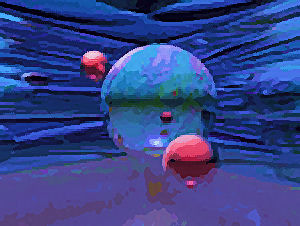
Deuterium Oxide - "Heavy Water" |
|
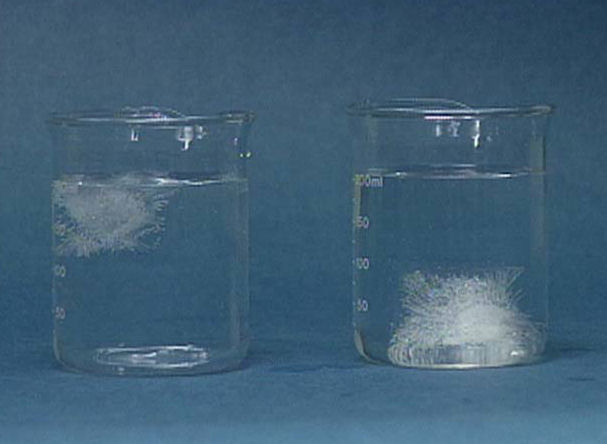
Ice floats in light water, sinks in heavy water |
|
Deuterium was discovered in the 1930s. Two particular things in the many descriptions of "heavy water" fascinated me. First, deuterium oxide was noted as useful in suppressing nuclear reactions, and second, D20 could be easily produced by anyone in their own home using water and a simple electrical apparatus.
Neil and I were not chemists or nuclear physicists, nor did we have time to consult with experts, but we took this basic information and built a plan to mount an anti-nuclear defensive system that, years later and much to our astonishment, shared many characteristics with the so-called "Star Wars" defense system that emerged during the early 1980s.
But first, Neil suggested that our plan ought to have a catchy acronym. He came up with "O.D.A.M.M.I.T." and then we worked hard to supply words that would fit the acronym. We made a chart with the name in large lettering, and I believe it read, "Organization for Deuterium Applications Mitigating Missiles with Interception Technology." After this slow start, we progressed rapidly.
The key to the whole plan was to create thousands of intercontinental ballistic missiles tipped with navigational technology and small bombs that would target and destroy incoming nuclear warheads while still in space. Upon impact with enemy missiles, our missiles would release a cloud of deuterium oxide which would serve to suppress any premature or accidental nuclear explosion that might occur.
In response to our questions, Mr. Owen Bennion, our chemistry teacher, told us that "heavy water" is not difficult to make, but the process is very slow. This led us to create in our plan a great benefit to all citizens of the United States. Every home could be provided with the simple electrical apparatus needed to create deuterium oxide, providing extra income to all participants. The ongoing home production of heavy water could provide a full employment economy for the U.S.
As they say in Scotland, "Many a mickle makes a muckle!"
|
|
|
We stayed up all night before our debate, working out the details of this inventive plan. We plodded through our morning classes, trying to stay awake. In the afternoon, we gathered up our new cards, which were neither pro nor con to the debate topic, but in fact completely superseded the topic.
Our debate class was held in the Little Theatre on the bottom floor of the Education Building. Mr. Bowthorpe sat in the audience seating toward the middle. He was the only spectator, and he held a pad of yellow legal paper so he could take notes.
Like baseball pitchers trying to make our change-ups look like fastballs, we tried to control our new-found enthusiasm for our cockamamie solution for coping with nuclear dangers in the world. As we described our plan, Ashworth and Knudson were two studies in dismay, but they tried for a while to cope with the unforeseen wrinkle we were throwing at them.
After a few speeches on both sides, however, Mr. Bowthorpe arose to his full height and said, "That's enough. These students came prepared to seriously challenge the debate topic, and you two are trying to do stand-up comedy." He walked down to the front, rather rapidly, and said, "Riddle and Christensen, out! And don't come back!"
The class period at that point was less than half over, so Neil and I exited the building and wandered aimlessly out on the lawn toward University Avenue.
"Do you suppose that we have been kicked out of school?" Neil asked me. He asked the question not in dread, but in delight. "I have always wanted to be kicked out of school," he added. "I read about the Utah childhood of Joseph F. Smith that he was expelled from school, and now I have been, too, I think."
I took the position that we had just been kicked out of debate class, but that being expelled from school would take additional administrative action -- due process -- and except for the somewhat irreverent name of our plan, we did have at least a mild defense -- we were trying to help up-and-coming debaters learn to cope with surprises.
To OUR surprise, the incident was not mentioned again by Mr. Bowthorpe or any other faculty or staff member, and life went back to normal. However, every time I passed Brent Ashworth in the hallway, he would grimace and shake his head. "How could anybody do something so stupid," he would mutter under his breath.
I agree that some of the basic assumptions of the Riddle/Christensen scheme were unscientific and laughable, but once you got past that, the plan had dozens of good, worthwhile advantages that should have been appealing to our U.S. military-industrial complex.
During the Ronald Reagan Administration, a version of our O.D.A.M.M.I.T. plan actually became national policy!
Of course, the Reagan era name for the idea -- "Star Wars" -- was light-years ahead of our moniker -- but with its own elements of absurdity unique to that era. In addition, Reagan's scientists largely ignored the unique advantages of "heavy water" which I feel was either a mistake, or a top secret withheld from general knowledge in the name of national security. :-)
Nevertheless, "Star Wars" played an important role in bringing down the U.S.S.R., which reduced the threat of nuclear attack from space, and ended the outdated international strategy of mutually assured destruction (M.A.D.).
Neil and I are still laughing, and as they say, "He who laughs last, laughs best."
--By Larry Christensen, Class of 1966
|
|
|
|
|
|
|
|

